非谓语动词及将来时表格归纳
- 格式:doc
- 大小:173.50 KB
- 文档页数:21

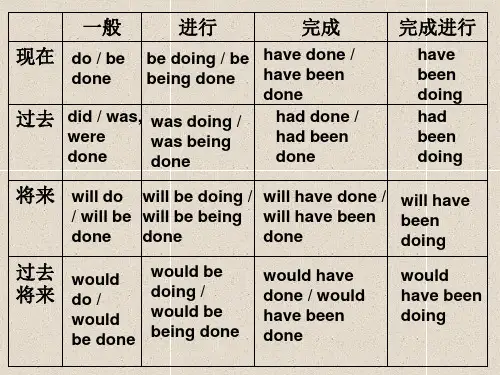
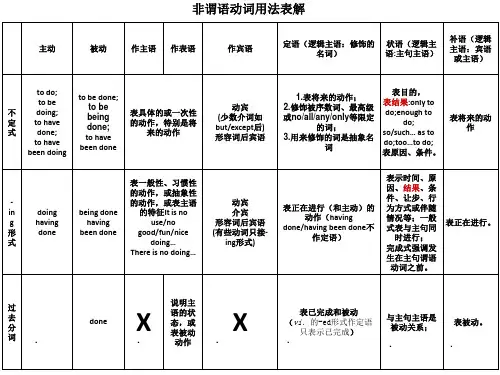

非谓语动词图表(总8页)--本页仅作为文档封面,使用时请直接删除即可----内页可以根据需求调整合适字体及大小--非谓语在句中充当除谓语以外的句子成分的动词形式叫做非谓语动词。
非谓语动词分为三种形式:不定式、动名词和分词(分词包括现在分词和过去分词)逻辑主语与真正主语真正主语:谓语动作发出者,即真正主语。
逻辑主语:非谓语动作的发出者或者承受者。
构成非谓语动词句型的首要条件:逻辑主语与真正主语一致。
To acquire knowledge , you must study解析:条件:此句真正主语:you 逻辑主语:you 主语一致。
结论:可构成非谓语句型非谓语使用条件一个句子当中,已经存在一个主句(谓语动词),又没有连词的情况下She got off the bus but left her handbag on her seat.She got off the bus, leaving her handbag on her seat.非谓语动词做主语的区别:1. ________ a language requires time and effort.A. LearnB. LearningC. To learnD. Being learned2. It is not always easy ________ invitations.A. to refuseB. refusingC. to be refusedD. being refused3. How __________ the problem will be discussed at tomorrow’s meeting.A. to solveB. to be solvedC. being solvedD. solving4. It __________ forty-five minutes __________ there by bus.A. cost, to getB. takes, gettingC. takes, to getD. takes, to get to5. It is no good __________. You should give_________.A. to smoke, it upB. smoking, it upC. smoking, up itD. to smoke, up it1. He gave us some advice on how ____ English.A. learningB. learnedC. to learnD. learn2. It ’s a pay day, and they are waiting ____.A. payB. payingC. paidD. to be paid3. I don’t know whether you happen, but I’m going to study in the this September . A.to be heard B. to be hearingC.to hear D. to have heard4. I forgot _____ my name when I finished ____ the composition.A. to sign, to writingB. to sign, writingC. signing, writing5. ---You were brave enough to raised objections at the meeting.---Well, now I regret ____ that.A. to doB. to be doingC. to have doneD. having done6. She can’t help ____ the house because she’s busy making a cake.A. to cleanB. cleaningC. cleanedD. being cleaned1. Her wish is __________ an engineer.A. becomingB. becomeC. to becomeD. being comepeople’s greatest pleasure is __________.A. fishingB. to fishC. to be fishingD. being fish3. The report was so _______ that they were all __________.A. inspiring, excitingB. inspiring, excitedC. inspired, excitedD. inspired, exciting4. ---“You look pale.”---“I feel a little __________.”A. tireB. tiredC. tiringD. tiresome非谓语动词做定语的区别:1. She said she had a important meeting ______.A. to attend inB. to attendC. attendD. attending2. He is always the first ______ questions.A. to answerB. answeringC. to be answeredD. being answered3. The Olympic Games _______ in the year 2016 will be a great success.A. being heldB. to be heldC. heldD. to hold4. The first textbooks ____ for teaching English as a foreignlanguage came out in the 16th century.A. having writtenB. to be writtenC. being writtenD. written5. At present, English is the main subject ___________ here.A. to be taughtB. being taughtC. teachingD. to be teaching6. ---"Who are those people with the banner"---"A group _______ itself the League for peace."A. callingB. callsC. calledD. is called7. The pen __________ belongs to me.A. which it is on the tableB. lying on the tableC. is on the tableD. which on the table1. I have enjoyed my visit here. I'll be very sorry __________.A. for leavingB. of leavingC. to leaveD. left2. I went to see him __________ him out.A. findingB. findC. only to findD. only found3. __________ the cry for help, people immediately rushedout of the rooms.A. To hearB. HearingC. Having heardD. They hearing4. __________ Hello, he reached out his hand.A. SaidB. SayingC. Talked aboutD. Talking to5. _________ from the tallest building, the whole city looks very beautiful.A. SeeB. SawC. SeeingD. Seen6. ___________ the past, our life is much better.A. Comparing withB. Be compared withC. To compare withD. Compared with非谓语动词做宾语补足语的区别:1. The doctor advised Lao Li __________ more rest.A. that he getB. to getC. would getD. get2. Soon they saw the boy _________ in the crowd.A. disappearB. to disappearC. disappearsD. disappeared3. Birds are seldom heard __________ at night.A. singB. singingC. to singD. to be singing4. He kept me __________ for many hours.A. to waitB. having been waitedC. waitingD. waited5. Mother caught the boy __________ in the corner.A. smokeB. to smokeC. smokingD. being smoked6. Having read the Emperor's New Clothes, we all found it ___.A. interestB. interestedC. interestingD. to interest7. I need this chapter __________ before tomorrow.A. rewritingB. rewrittenC. rewriteD. to write again8. When she returned home, she found the window open and something __________.A. to stealB. losingC. missedD. stolen9. There was so much noise that the speaker could not make himself _________.A. being heardB. heardC. hearingD. hear非谓语动词的时态和语态:1. around the Water Cube, we were then taken to see the Bird’s Nest for the 2008 Olympic Games. A. Having shown B. To be shown C. Having been shown D. To show2.【2012重庆】______to work overtime that evening, I missed a wonderful film.A. Having been asked B. To ask C. Having asked D. To be asked3.【2008福建】___ in the queen for half an hour, the old man suddenly realized be had left the cheque in the car. A. Waiting B. To wait C. Having Waited D. To have waitedson pretended _______ when I came back.A. to sleep B. sleeping C. being sleeping D. to be sleeping5.【2011上海】Today we have chat rooms, text messaging, emailing…, but we seem _____ the art of communicating face-to-face.A. losing B. to be losing C. to be lost D. having lostis the man ____now?A. operating on B. operated on C. being operated on D. to be operated onquestion ______ now at the meeting is not the question ______ yesterday.A. discussed; discussed B. discussing; had discussedC. being discussed; discussed D. discussing; discussingasked ___ to work in the countryside.A. to be sent B. to send C. to be sending D. sendinga letter, he decided to send a telegram.A. Not receiving B. Receiving not C. Not having received D. Having not received10The purpose of new technologies is to make life easier, ______ it more difficult.A. not make B. not to make C. not making D. do not make独立主格结构1)独立主格结构的逻辑主语与句子的主语不同,它独立存在。
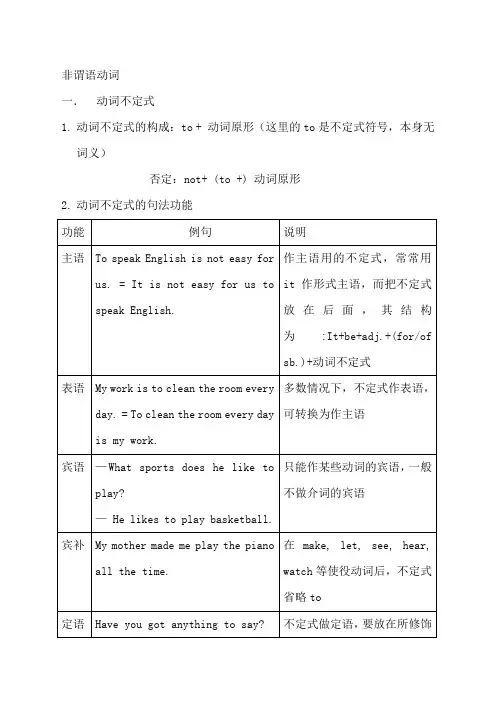
非谓语动词一.动词不定式1.动词不定式的构成:to + 动词原形(这里的to是不定式符号,本身无词义)否定:not+ (to +) 动词原形2.动词不定式的句法功能1.to do 作主语常用it 作形式主语例: To learn English well is useful. → It is useful(for us)to learn English well.注意:在kind, good, nice, clever等表示人的品质的形容词后,不用for而用of.2.一些表示命令,打算或希望的动词后只接动词不定式作宾语:would like, like(想要), want, wish, hope, decide, plan, except等。
例:Would you like too see a film this evening?3.在find, think后跟动词不定式作宾语时,常用it代替,而将真正的宾语放在句末。
例:I find it easy to read English every day.4.常见的一些不带to 的动词不定式作宾语Why not do ……, why don’t you do…, had better (not) do…, would rater do…, could/ would/ will you please (not) do…例: I would rather stay in the room.5.一些使役动词和感官动词用不定式作宾语,但to要省略。
一感(fell)、二听(hear, listen to)、三让(let/ make/ let)、四看(look at, see, watch, notice)、五帮助(help),但变为被动语态是必须加上to.例:My friends were made to work the whole night by the boss.6.不定式常和疑问词what,which,when,where,how连用,相当于一个宾语从句。
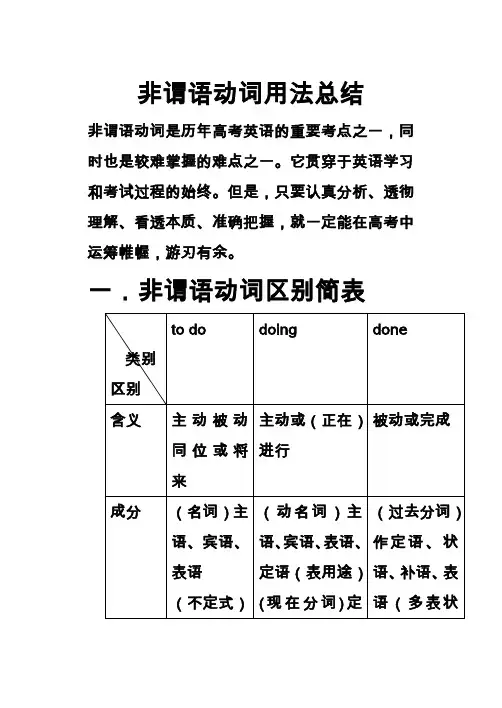
非谓语动词用法总结非谓语动词是历年高考英语的重要考点之一,同时也是较难掌握的难点之一。
它贯穿于英语学习和考试过程的始终。
但是,只要认真分析、透彻理解、看透本质、准确把握,就一定能在高考中运筹帷幄,游刃有余。
一.非谓语动词区别简表二.不定式的用法不定式不可作谓语,但它可以有自己的宾语、状语,构成不定式短语,在句中可以作主语、宾语、表语、定语(表用途)、状语或补足语。
高考对不定式的考查主要有不定式的时态、语态、作用、否定、省略、连词+不定式等。
作主语不定式作主语表示具体的动作,通常指一件已知的事或目的。
不定式作主语时,谓语动词用单数。
eg:To say is a thing,to do is another.(说是一回事,做是另外一回事。
)(2)不定式短语较长时,通常放在谓语之后,用it作形式主语。
eg:①It is important to learn English well.(学好英语是重要的。
)②It is necessary for us to do the job well.(我们做好这项工作是必要的。
)③It is a great honor to be invited to give a speech here.(被邀请在这儿发表演讲是一个极大的荣幸。
)2.作宾语(1)常只用不定式作宾语的动词有:want,wish,hope,long,expect,desire,intend,decid e,ask,promise,aim,offer,agree,plan,learn,choos e,refuse,fail,manage,pretend等。
eg:①He refused to help me.(他拒绝帮助我.)②She has agreed to come tomorrow.(他已同意明天来.)(2) 不定式较长时,作宾语,也可用it代替,放在后面。
eg;I find it difficult to do the job well.(3) “特殊疑问词﹢不定式to do结构”具有名词特征,可作宾语。
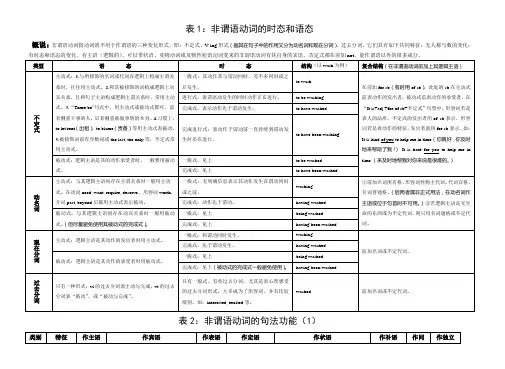
表1:非谓语动词的时态和语态
概说:非谓语动词指动词的不用于作谓语的三种变化形式,即:不定式、V-ing形式(据其在句子中的作用又分为动名词和现在分词)、过去分词。
它们具有如下共同特征:无人称与数的变化;有时态和语态的变化、有主语(逻辑的)、可以带状语、及物动词或及物性短语动词变来的非谓语动词有其自身的宾语。
否定式都在前加not。
能作谓语以外的很多成分。
表2:非谓语动词的句法功能(1)
表3:非谓语动词的句法功能(2)
表4:非谓语动词的句法功能(3)。

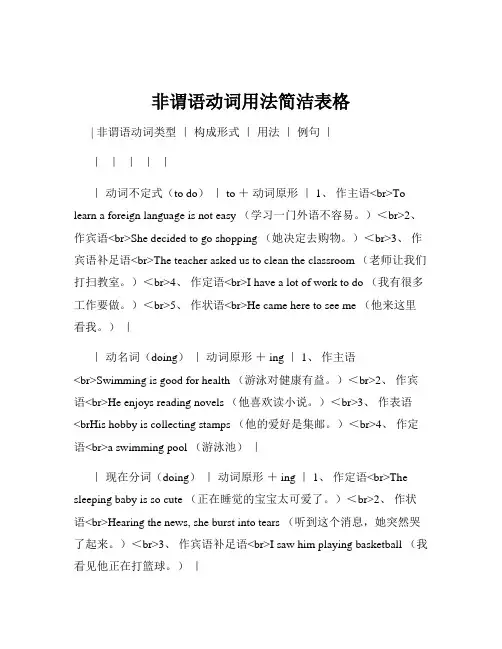
非谓语动词用法简洁表格| 非谓语动词类型|构成形式|用法|例句|||||||动词不定式(to do)| to +动词原形| 1、作主语<br>To learn a foreign language is not easy (学习一门外语不容易。
)<br>2、作宾语<br>She decided to go shopping (她决定去购物。
)<br>3、作宾语补足语<br>The teacher asked us to clean the classroom (老师让我们打扫教室。
)<br>4、作定语<br>I have a lot of work to do (我有很多工作要做。
)<br>5、作状语<br>He came here to see me (他来这里看我。
)||动名词(doing)|动词原形+ ing | 1、作主语<br>Swimming is good for health (游泳对健康有益。
)<br>2、作宾语<br>He enjoys reading novels (他喜欢读小说。
)<br>3、作表语<brHis hobby is collecting stamps (他的爱好是集邮。
)<br>4、作定语<br>a swimming pool (游泳池)||现在分词(doing)|动词原形+ ing | 1、作定语<br>The sleeping baby is so cute (正在睡觉的宝宝太可爱了。
)<br>2、作状语<br>Hearing the news, she burst into tears (听到这个消息,她突然哭了起来。
)<br>3、作宾语补足语<br>I saw him playing basketball (我看见他正在打篮球。
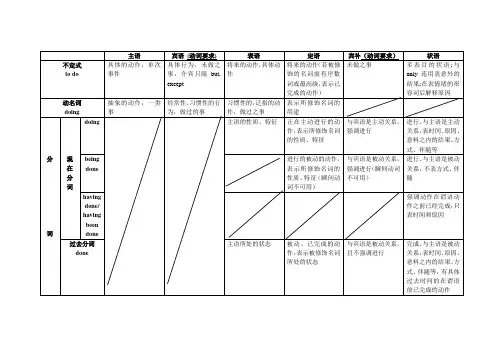

非谓语动词及将来时表格归
纳
-标准化文件发布号:(9556-EUATWK-MWUB-WUNN-INNUL-DDQTY-KII
非谓语动词的用法
在英语语法中,掌握好动词的用法是最重要的,而非谓语动词又是动词中非常重要的一部分,由于它们内容多,有些用法相似,所以不好掌握,经常被混淆用错,下面通过列表比较的方式,分析非谓语动词的主要用法。
非谓语动词和谓语动词的相对时间关系
二.非谓语动词的被动语态 1. 非谓语动词被动语态的意义
2. 一般现在分词,完成的现在分词和过去分词表示被动意义的区别
三.非谓语动词的句法作用
1. 非谓语动词的句法作用一览表
2. 非谓语动词作主语
3. 非谓语动词作宾语
4. 非谓语动词作表语
5. 非谓语动词作定语
6. 非谓语动词作状语
7. 非谓语动词作同谓语
8. 非谓语动词作插入语
四. 非谓语动词的特殊形式
五. 非谓语动词的否定形式
英语中将来时的表示形式
表示将要发生的动作和状态在英语中用将来时,将来时在英语中有多种表达形式,为了掌握它们的区别和用法,下面笔者对它们进行分类总结。
非谓语动词非谓语动词相对谓语动词的时间意义例句一般式不定式说明行为在谓语动词所表示的行为之后,多数是那些表愿望的词:want; hope; expect; wish等。
I want to go home.I hope to see you.说明行为与谓语动词表示的行为同时发生,多数是那些省略不定式符号的词,一般是复合宾语。
I saw him come in.He helped him (to) carry things.一般式动名词表示动作与谓语动词表示的动作同时发出。
We enjoyed seeing the film.I am thinking of taking over the job.在动词insist on; rely on; count on(相信)等后表示动作在谓语动词表示的动作之后发生。
He insisted on doing that work在有些明确表示时间先后的动词和介词on;upon after代替完成动名词表示的动作在谓语动词表示的动作先发生。
I remember seeing him before.On arriving Beijing, he went to see his friend.一般式分词现在分词持续性动词说明分词表示的动作和句中谓语动词表示的动作同时发生。
He stood there speaking.Holding a book under his arm, he entered theroom.终止性动词说明分词表示的动作发生之后,句中谓语动词表示的动作立刻发生。
Entering the room, I found nobody in.Turning to the right, you will find the post office.过去分词持续性动词通常说明分词表示的动作,此句中谓语动词表示的动作先发生。
Written in simple English, the book is easy toread.I can't find my lost pen.说明分词表示的动作和句中谓语动词表示的动作并无先后。
非谓语动词及将来时表格归
纳
-标准化文件发布号:(9556-EUATWK-MWUB-WUNN-INNUL-DDQTY-KII
非谓语动词的用法
在英语语法中,掌握好动词的用法是最重要的,而非谓语动词又是动词中非常重要的一部分,由于它们内容多,有些用法相似,所以不好掌握,经常被混淆用错,下面通过列表比较的方式,分析非谓语动词的主要用法。
非谓语动词和谓语动词的相对时间关系
二.非谓语动词的被动语态 1. 非谓语动词被动语态的意义
2. 一般现在分词,完成的现在分词和过去分词表示被动意义的区别
三.非谓语动词的句法作用
1. 非谓语动词的句法作用一览表
2. 非谓语动词作主语
3. 非谓语动词作宾语
4. 非谓语动词作表语
5. 非谓语动词作定语
6. 非谓语动词作状语
7. 非谓语动词作同谓语
8. 非谓语动词作插入语
四. 非谓语动词的特殊形式
五. 非谓语动词的否定形式
英语中将来时的表示形式
表示将要发生的动作和状态在英语中用将来时,将来时在英语中有多种表达形式,为了掌握它们的区别和用法,下面笔者对它们进行分类总结。
谓语动词、非谓语动词 vs时态、语态四级语法讲义一:时态:所谓的"时态",就是时间+状态。
谓语动词的时态见下表:过去现在将来过去将来一般 did do will/shall do should/woulddo 进行 was/were doing am/is/are doing will/shall be doing / 完成had done have/has done will/shall have should/woulddone have done用于虚拟语气完成进行 had been doing have/has been / /doing1(主动形式过去现在将来过去将来一般 was/were given am/is/are givenwill/shall be given should/wouldbe given 进行 was/were being am/is/are being / /given given完成 had been given have/has been will/shall have should/wouldgiven been given have beengiven 完成进行 / / / 2(被动形式, CET-4 常考的三种时态:过去完成时;将来完成时;(现在/过去)完成进行时。
, 时间状语从句当中的时态:一般过去时所有的过去用一般现在时表示现在和将来现在完成时现在完成和将来完成一(非谓语动词一(不定式:一)不定式的常考形式:1) 一般形式:He decided to work harder in order to catch up with the others.被动形式: He preferred to be assigned some heavier work to do.语法功能: 表示与谓语动词同步发生2) 完成形式:He pretended not to have seen me.被动形式:The book is said to have been translated into many languages.语法功能:表示发生在谓语动词之前二)不定式常考的考点:1)不定式做定语----将要发生2)不定式做状语----目的3)不定式充当名词功能---To see is to believe.三)不定式的省略1)感官动词 see, watch, observe, notice, look at, hear, listen to, smell, taste, feel+ do 表示动作的完整性,真实性;+ doing 表示动作的连续性,进行性I saw him work in the garden yesterday.昨天我看见他在花园里干活了。
非谓语动词的用法总结表格非谓语动词包括不定式,动名词和分词。
它们是高中所学的基础语法,也是高考必考内容。
既是高考的难点又是高考的热点。
真正领悟非谓语动词的用法要具备以下基础知识:①具有句子结构的知识,会分析句子成分。
②具有简单句最基本的五种句型的知识,要分得清双宾语和复合宾语。
③具有扎实而丰富的动词知识,要分得清及物动词和不及物动词。
④具备各种复合句的知识,能够拆析复合句和长难句。
●所有非谓语动词的否定形式都是把否定副词not放在非谓语动词的_前面_知识点一:非谓语作状语。
非谓语动词作状语多表示伴随状态,或事情发生的原因,结果,时间,条件等。
注意,作目的状语只能是_不定式,也可用in order to / so as to +动词原形。
解题诀窍:找逻辑主语,辩逻辑关系,析动作先后●不定式做结果状语的固定搭配only to do ,too +adj/adv to do,so +adj/adv as to do ,such +n as to do adj/ adv enough to doonly to do 常表示意想不到或不愉快的结果。
.知识点二:非谓语作定语解题诀窍:找所修饰的词,辩逻辑关系,析动作先后,面须有相应的介词。
2. 不定式用来修饰名词,表动作未发生。
3. 不定式用来修饰被序数词,最高级等限定的中心词。
知识点三:非谓语动词做补语解题技巧:记固定搭配,辩逻辑关系不定式和分词作宾语补足语(we consider him to be a nice guy)或主语补足语(He is considered to be a nice guy)是考察的重点.做题时一要熟记固定搭配,还要仔细分析非谓语所表示的动作与谓语动作发生的先后问题。
A 固定句型sb/sth be said/believed/ reported/ considered/ thought to do /to be doing /to have done 要分清.B 弄清以下搭配及其意义1.感官动词see, watch, observe, hear, listen to, notice等后面的宾补有3种形式(do/doing/done),doing表主动或正在进行,done表被动或完成,do表主动和完成(被动句中to 还原)。
非谓语动词的用法
在英语语法中,掌握好动词的用法是最重要的,而非谓语动词又是动词中非常重要的一部分,由于它们内容多,有些用法相似,所以不好掌握,经常被混淆用错,下面通过列表比较的方式,分析非谓语动词的主要用法。
非谓语动词和谓语动词的相对时间关系
二.非谓语动词的被动语态1. 非谓语动词被动语态的意义
2. 一般现在分词,完成的现在分词和过去分词表示被动意义的区别
三.非谓语动词的句法作用
1. 非谓语动词的句法作用一览表
2. 非谓语动词作主语
3. 非谓语动词作宾语
4. 非谓语动词作表语
5. 非谓语动词作定语
6. 非谓语动词作状语
7. 非谓语动词作同谓语
8. 非谓语动词作插入语
四. 非谓语动词的特殊形式
五. 非谓语动词的否定形式
英语中将来时的表示形式
表示将要发生的动作和状态在英语中用将来时,将来时在英语中有多种表达形式,为了掌握它们的区别和用法,下面笔者对它们进行分类总结。